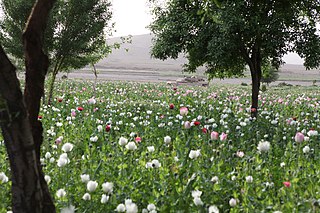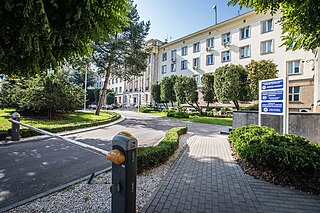Related Research Articles

Homicide is an act in which a person causes the death of another person. A homicide requires only a volitional act, or an omission, that causes the death of another, and thus a homicide may result from accidental, reckless, or negligent acts even if there is no intent to cause harm. It is separate from suicide.

Uruzgan, also spelled as Urozgan or Oruzgan, is one of the thirty-four provinces of Afghanistan. Uruzgan is located in the center of the country. The population is 436,079, and the province is mostly a tribal society. Tarinkot serves as the capital of the province. Uruzgan borders the provinces of Kandahar, Daykundi, Ghazni, Zabul, and Helmand.

The United Nations Office on Drugs and Crime is a United Nations office that was established in 1997 as the Office for Drug Control and Crime Prevention by combining the United Nations International Drug Control Program (UNDCP) and the Crime Prevention and Criminal Justice Division in the United Nations Office at Vienna, adopting the current name in 2002.
Opium replacement or opium substitution refers to the process of substituting opium poppy cash crops with non-narcotic alternatives.

The Golden Triangle is a large, mountainous region of approximately 200,000 km2 (77,000 sq mi) in northeastern Myanmar, northwestern Thailand and northern Laos, centered on the confluence of the Ruak and Mekong rivers. The name "Golden Triangle" was coined by Marshall Green, a U.S. State Department official, in 1971 in a press conference on the opium trade. Today, the Thai side of the river confluence, Sop Ruak, has become a tourist attraction, with the House of Opium Museum, a Hall of Opium, and a Golden Triangle Park, and no opium cultivation.

Afghanistan has long had a history of opium poppy cultivation and harvest. As of 2021, Afghanistan's harvest produces more than 90% of illicit heroin globally, and more than 95% of the European supply. More land is used for opium in Afghanistan than is used for coca cultivation in Latin America. The country has been the world's leading illicit drug producer since 2001. In 2007, 93% of the non-pharmaceutical-grade opiates on the world market originated in Afghanistan. By 2019 Afghanistan still produced about 84% of the world market. This amounts to an export value of about US$4 billion, with a quarter being earned by opium farmers and the rest going to district officials, insurgents, warlords, and drug traffickers. In the seven years (1994–2000) prior to a Taliban opium ban, the Afghan farmers' share of gross income from opium was divided among 200,000 families.
This article deals with activities of the U.S. Central Intelligence Agency related to transnational crime, including the illicit drug trade.

Crime in Poland refers to the incidence, deterrence, and handling of criminal activity in the Republic of Poland by Polish law enforcement agencies charged with ensuring public safety and maintaining order. Poland ranks favorably in terms of public safety, with one of the lowest homicide rates in Europe. Poland was ranked 25th in the 2022 Global Peace Index and scored 0.0 on the 2023 Global Terrorism Index.
Norine A. MacDonald KC is the President and Founder of RAINCLOUD, a global business and knowledge hub for the Defense + AI ecosystem.
The United Nations Interregional Crime and Justice Research Institute (UNICRI) is one of the five United Nations Research and Training Institutes. The institute was founded in 1968 to assist the international community in formulating and implementing improved policies in the field of crime prevention and criminal justice. Its work currently focuses on Goal 16 of the 2030 Agenda for Sustainable Development, that is centred on promoting peaceful, just and inclusive societies, free from crime and violence.
The International Council on Security and Development (ICOS) is an international think tank that focuses on Afghanistan and other conflict zones all over the world such as Iraq, Syria and Somalia. ICOS is a project of the Network of European Foundations' The Mercator Fund. The organization was originally named the Senlis Council in 2002 but later in 2013 renamed as the International Council on Security and Development to reflect the interest and activities of the organization.

Opium production in Myanmar has historically been a major contributor to the country's gross domestic product (GDP). Myanmar is the world's largest producer of opium, producing some 25% of the world's opium, and forms part of the Golden Triangle. The opium industry was a monopoly during colonial times and has since been illegally tolerated, encouraged and informally taxed by corrupt officials in the Tatmadaw, Myanmar Police Force and rebel fighters, primarily as the basis for heroin manufacture. While opium poppy cultivation in Myanmar had declined year-on-year since 2015, cultivation area increased by 33% totalling 40,100 hectares alongside an 88% increase in yield potential to 790 metric tonnes in 2022 according to latest data from the United Nations Office on Drugs and Crime (UNODC) Myanmar Opium Survey 2022. With that said, the United Nations Office on Drugs and Crime (UNODC) has also warned that opium production in Myanmar may rise again if the economic crunch brought on by COVID-19 and the country's February 1 military coup persists, with significant public health and security consequences for much of Asia.
The Institute for Security Studies, also known as ISS or ISS Africa, described itself as follows: "an African organisation which aims to enhance human security on the continent. It does independent and authoritative research, provides expert policy analysis and advice, and delivers practical training and technical assistance." Their areas of research include transnational crimes, migration, maritime security, development, peacekeeping, peacebuilding, crime prevention, criminal justice, conflict analysis and governance. It is the largest independent research institute in Africa dealing with human security and is headquartered in Pretoria, South Africa, with offices in Kenya, Ethiopia and Senegal. In 2019, it was ranked 116th by the Global Go To Think Tanks Report and 55th among think tanks outside the United States.
Maritime cocaine smuggling refers to the practice which involves the smuggling of cocaine between borders via maritime means. According to the United Nations Office on Drugs and Crime (UNODC), there are an estimated 18 million users of cocaine globally. Approximately 70–80% of cocaine is at some point smuggled across the ocean, originating from South America. Cocaine remains the "highest value criminal commodity for transnational organised crime", motivating the criminal organisations responsible for maritime smuggling practices. Maritime cocaine smuggling is therefore an ongoing international issue, as criminal organisations are finding new and innovative ways of smuggling cocaine and go undetected by authorities.
Illicit drug trafficking in the West Indian Ocean (WIO) has increasingly become a major security concern for many States in the region, and is gaining international attention. The Indian Ocean borders 24 states, and accounts for a third of the world’s ocean area. Until recently, other challenges, such as piracy off the coast of Somalia, has been at the forefront of international action. However, the utilisation of the Southern route by drug traffickers, and the consequent issues this has caused, has led to increased focus on how to tackle this issue.

Roelien J. Kamminga is a Dutch politician and civil servant who has represented the conservative-liberal People's Party for Freedom and Democracy (VVD) in the House of Representatives since 2021. She previously worked at the Ministry of the Interior and Kingdom Relations for most of her career.
Seychelles is a small island nation with a vast maritime territory, consisting of 115 islands and a 137-million-square-kilometre (53-million-square-mile) Exclusive Economic Zone. The prevalence of drugs in the country is high and the country is experiencing a heroin epidemic, with an equivalent to 10% of the working force using heroin in 2019. Due to its location along a major trafficking route, drugs can easily be trafficked by sea to the Seychelles.
References
- ↑ "RAINCLOUD Team". RAINCLOUD. Retrieved Dec 17, 2024.
- ↑ Kamminga, Jorrit (2013). "Towards an International Economic Security Regime for Alternative Development in Illicit Drug Producing Countries: Exploring International Support for Alternative Livelihoods in Colombia". University of Valencia. Retrieved Dec 17, 2024.
- ↑ Kamminga, Jorrit (2015). "Chapter 2: Alternative Development". World Drug Report - 2015 (PDF) (Report). United Nations Office on Drugs and Crime (UNODC). Retrieved Dec 17, 2024.
- ↑ Bulletin on Narcotics (PDF). United Nations Office on Drugs and Crime (UNODC). 2017. ISBN 978-92-1-148303-1 . Retrieved Dec 17, 2024.
- ↑ Kamminga, Jorrit (2022). "Booklet 5: Drugs and the Environment". World Drug Report - 2022 (PDF) (Report). United Nations Office on Drugs and Crime (UNODC). Retrieved Dec 23, 2024.
- ↑ Kamminga, Jorrit (2023). "Practical Guide on Alternative Development and the Environment". Practical Guide 2023 (PDF) (Report). United Nations Office on Drugs and Crime (UNODC). Retrieved Dec 23, 2024.
- ↑ Kamminga, Jorrit. "About the life-cycle assessment of illict drugs - and why we urgently need a green drug policy". GPDPD. Retrieved Dec 17, 2024.
- ↑ IOB evaluation – Inconvenient realities (PDF) (Report). Independent Office of Evaluation (IOB). 2020. Retrieved Dec 17, 2024.
- ↑ IOB Evaluatie: Tussen wens en werkelijkheid (Report) (in Dutch). Independent Office of Evaluation (IOB). 2023. Retrieved Dec 17, 2024.
- ↑ "Author - Jorrit Kamminga". Clingendael Spectator. Retrieved Dec 17, 2024.
- ↑ ‘Leading the Way’: Women driving peace and security in Afghanistan, the Occupied Palestinian Territory and Yemen (Report). Oxfam. 2021. Retrieved Dec 17, 2024.
- ↑ Because She Matters: Ensuring women’s meaningful participation in peacebuilding in Afghanistan (Report). Oxfam. 2020. Retrieved Dec 17, 2024.
- ↑ Behind closed doors: The risk of denying women a voice in determining Afghanistan's future (Report). Oxfam. 2014. Retrieved Dec 17, 2024.
- ↑ Fontes, Robin; Kamminga, Jorrit (March 24, 2024). "Ukraine A Living Lab for AI Warfare". National Defense Magazine. Retrieved Dec 17, 2024.
- 1 2 Kamminga, Jorrit (Sep 27, 2022). "More Than a Bicycle Brake on a Missile: AI Ethics in Defense". War on the Rocks. Retrieved Dec 17, 2024.
- ↑ "Angry Young Men in Afghanistan? - Episode I". L.I.S.A. Wissenschafts Portal. Nov 12, 2012. Retrieved Dec 18, 2024.
- ↑ Duran, Cristina; Kamminga, Jorrit (2020). Zahra: A policewoman in Afghanistan. Oxfam. ISBN 978-1-78748-695-9 . Retrieved Dec 18, 2024.
- ↑ "'El día 3', de Cristina Durán, Miguel Ángel Giner y Laura Ballester, Premio Nacional del Cómic 2019". Ministerio de Cultura (in Spanish). Nov 12, 2019. Retrieved Dec 18, 2018.
- ↑ Kamminga, Jorrit (2021). Je wordt bedankt, Bin Laden (in Dutch). Jalapeño Books. ISBN 9789493137028 . Retrieved Dec 18, 2024.